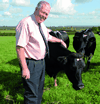Building trust will be key to Natural England’s success

Poul Christensen is unsure where he will start work next Monday (2 October). But one thing is certain: He won’t be behind a desk.
“Practical environmental benefits are not delivered by piles of paper, they are delivered by people doing something on the ground,” he says. “That’s where I’ll be – out somewhere in the countryside.”
| “Natural England has a vital job to do delivering environmental schemes that enable farmers to combine environmental enhancement with profitable farming. Its biggest priority must, therefore, be to understand and support the role of profitable agriculture in delivering a vibrant rural economy and a diverse, well-managed countryside.” Peter Kendall, NFU president |
As deputy chairman of Natural England, Mr Christensen is determined that the government’s new landscape agency should not be seen as “just another quango” telling farmers what they can and cannot do.
“The countryside is the result of centuries of land management and the government is actually paying people to manage it now.
Taxpayers are getting something for their money and farmers are actually delivering something.”
Natural England is being formed by merging English Nature with the Rural Development Service’s environmental responsibilities and the Countryside Agency’s landscape, access and recreation division.
“It’s a new contract between farmers and the government and I think farmers should exploit it. There has been a phenomenal change in attitude and it means a hands-on approach is vital.”
Mr Christensen has his work cut out. Natural England’s wide-ranging remit includes responsibility for overseeing environmental schemes, protecting the rural landscape and promoting access to the countryside.
But the flagship organisation has already seen its budget cut by £12m after the government ordered DEFRA and its agencies to tighten their belts to pay for the single farm payment fiasco earlier this year.
Yet Mr Christensen remains philosophical. Before his new job, he was chairman of DEFRA’s Rural Development Service. It gave him a valuable insight into the often delicate relationship between farmers and civil servants.
As a result, farmers who have signed up to Environmental Stewardship are likely to notice few changes in their immediate day-to-day dealings with the government officials who administer the schemes.
“The day job for a lot of people involved will continue exactly as it is, so the people who are delivering environmental stewardship schemes will continue to maintain their relationship with farmers.
“Instead of three doors for farmers to go through, there will only be one. It will be much simpler for the farmers and land managers we work with, and maintaining a good relationship with them is going to be crucial.”
| ” As three-quarters of the land is farmed, Natural England needs to work with rather than against the occupiers of that land to meet its objectives. We want to see a genuine partnership that recognises and helps with farmers’ need to be profitable alongside the assistance given to deliver a greater range of public benefits from our countryside.” George Dunn, chief executive, Tenant Farmers’ Association |
He farms in a family partnership at Kingston Hill Farm, renting 312ha (770 acres) from St John’s College, Oxford. In a previous life he was chairman of Milk Marque and the UK Federation of Milk Groups.
When it comes to Natural England, Mr Christensen maintains there have already been a number of successes. The agency is on course to meet its target of having 60% of England’s total agricultural area under Environmental Stewardship by 2007, he says.
But it is not all plain sailing. It remains to be seen how Natural England will seek to protect the rural landscape while simultaneously encouraging more people to visit the countryside and opening up access to England’s coastline.
“We have to reassure the large land-owning groups such as the NFU and CLA that we will discuss and talk them through this. In some cases there is a justifiable fear about increased access, but in many cases there is not. It can work.
| ” The launch of Natural England probably poses the biggest challenge to us all. Our key hope is that it recognises the legacy and successes already achieved and does not lose the focus of farming and conservation, because many of its strategic targets rest on farmers managing the countryside successfully and profitably.” Michael Woodhouse, director England, Farming & Wildlife Advisory Group |
“Somehow we have to work with people so they understand it is as much an opportunity as it is a threat. It’s not easy sometimes, but the experience we’ve had will help us enormously. Much of it is to do with building trust.”
This trust-building exercise means Natural England will not put the interests of the urban majority who use the countryside for recreation above the needs of the rural minority for whom it is a place of work, Mr Christensen insists.
“As well as increasing access to the countryside, advocacy and education will be very much part of what we will be doing. ‘Educate’ is a pejorative term I guess, but we need the public to understand that with rights come responsibilities.
“It will be a big job. Some of the poor devils who farm on the urban fringe will know how difficult it is. As a farmer myself, I don’t underestimate the task ahead, but it is very important that we rise to the challenge.”
WHAT WILL NATURAL ENGLAND DO? |
|
